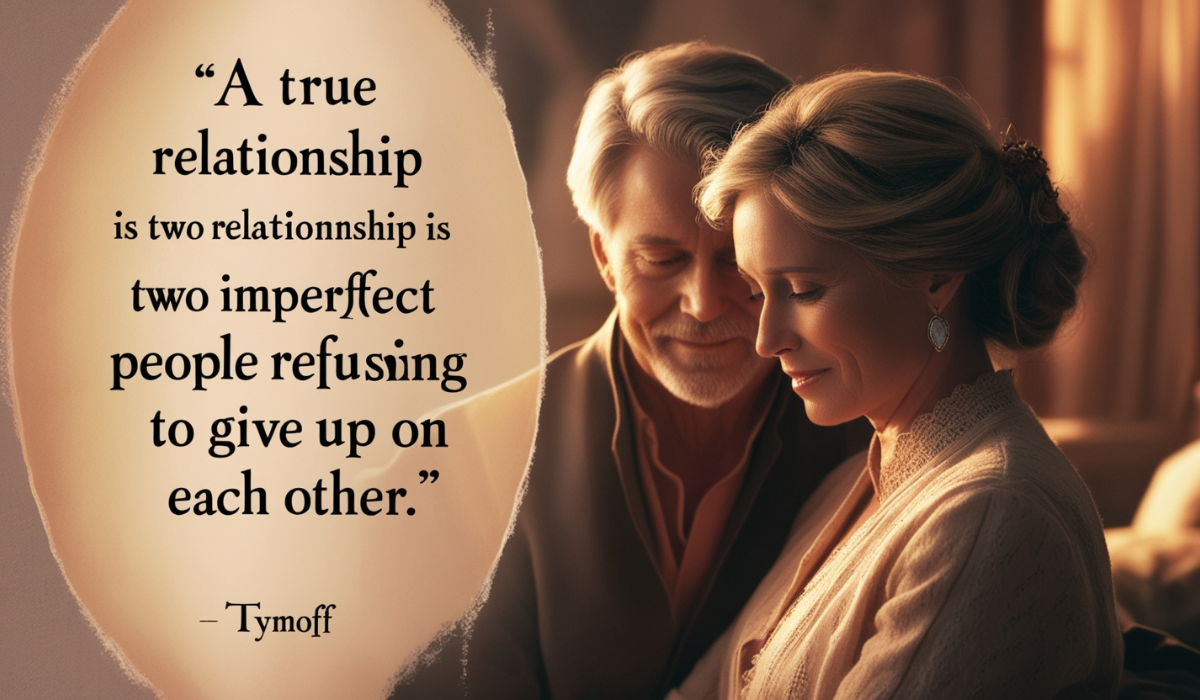Introduction
The concept of relationships has constantly evolved. Still, at its core, one truth remains constant a true relationship requires effort, patience, and an unshakeable commitment to making it work. “A true relationship is two imperfect people refusing to give up” is a significant indication of the pith of getting through affection. It’s about celebrating imperfections, fostering open communication, and developing emotional intelligence to build a lasting partnership.
This blog dives into what makes relationships thrive, even in a world constantly reshaped by social media, changing perspectives, and modern expectations. By the end of this article, you’ll understand how to prioritize what matters most in your relationship and how to transform imperfections into strengths.
The Changing Definition of Relationships
Relationships today bear the imprint of our modern world fast-paced, hyper-connected, and influenced by digital culture. Social media plays a crucial role in shaping expectations. While it connects people, it can also create unrealistic ideals of “perfect” partnerships, making real relationships seem flawed in comparison.
However, no relationship is perfect. The key lies in redefining perfection: it’s not about flawless compatibility but mutual respect, resilience, and growth.
Why Perfect Relationships Don’t Exist
- Every Individual Is Unique: Each person brings their own life experiences, quirks, and challenges into a relationship.
- Unrealistic Expectations Create Pressure: Seeking perfection often leads to frustration.
- Growth Happens Through Imperfection: Challenges and differences can serve as opportunities to deepen your bond and learn from one another.
Critical Elements of a True Relationship
Celebrating Imperfections
At its heart, a genuine relationship embraces imperfection. Instead of expecting your partner to fit an ideal image, recognizing and valuing their unique qualities strengthens your bond.
Ways to celebrate each other’s imperfections:
- Shift Perspective: See differences as complementary rather than conflicting.
- Practice Gratitude: Focus on the qualities you love in your partner.
- Be Forgiving: Accept mistakes and learn from them together.
Open and Honest Communication
Healthy communication forms the backbone of any long-lasting relationship. Open dialogue fosters trust, understanding, and connection.
Tips to Improve Communication in Your Relationship:
- Create time for uninterrupted conversations.
- Use “I” statements to express feelings without making accusations.
- Practice active Listening. Listening means seeking to understand, not reply.
- Be open to feedback, even when it’s constructive criticism.
Example Table of Communication Habits
| Communication Habit | Positive Impact |
|---|---|
| Active Listening | Builds trust and prevents misunderstandings |
| Using “I” Statements | Reduces defensiveness and fosters connection |
| Regular Check-Ins | Keeps the relationship aligned and healthy |
3. Developing Emotional IntelligenceDeveloping Emotional Intelligence
Emotional intelligence (EI) is the ability to recognize, understand, and manage one’s emotions while empathizing with one’s partner’s feelings. It’s crucial for navigating disagreements and ensuring a harmonious relationship.
Steps to Build Emotional Intelligence:
- Self-Awareness: Understand your emotional triggers to avoid impulsive reactions.
- Sympathy: Come at the situation from your accomplice’s perspective during clashes.
- Self-Regulation: Express frustration without resorting to blame or anger.
- Social Skills: Foster collaborative problem-solving and compromise.
The more you learn to manage emotions constructively, the stronger your partnership becomes.
Compromise and Balance
Relationships are a delicate dance of give and take. Compromise doesn’t mean giving up your needs; it means finding a balance where both partners feel valued.
Significant Areas for Compromise in Relationships:
- Time Management: Balancing work, personal time, and togetherness.
- Shared Responsibilities: Household chores, finances, or child-rearing.
- Values and Traditions: Honoring each other’s beliefs while finding common ground.
Striving for equality creates a sense of partnership, where both individuals feel heard and respected.
How to Pick the Right Partner
Picking a day to day existence accomplice is quite possibly of your most critical choice. While perfection isn’t attainable, compatibility and shared values are vital.
Criteria for Choosing Your Partner:
- Aligned Goals: Do you envision similar futures? (e.g., career, family plans)
- Core Values: Do you share beliefs about honesty, loyalty, or lifestyle?
- Adaptability: Can they grow with you as life changes?
- Conflict Resolution: Are they willing to resolve conflicts fairly?
Having clear priorities ensures you focus on what truly matters in a partner.
| Criteria | Important? (Yes/No) | How Partner Meets or Doesn’t Meet This |
|---|---|---|
| Shared Life Goals | Yes | They value similar career ambitions and family priorities. |
| Effective Conflict Resolution | Yes | Open to conversations during disagreements. |
| Aligned Values | No | Slight differences but complementary perspectives. |
The Role of Social Media in Modern Relationships
Social media has transformed how people connect but also introduced challenges. Comparing our relationships to what’s seen online can erode self-worth, create unrealistic benchmarks, and negatively impact authentic connections.
Tips for Healthy Social Media Usage:
- Limit time spent scrolling if it leads to self-doubt.
- Focus on your real relationship rather than online portrayals.
- Set boundaries for digital interactions to prioritize quality time together.
Actionable Insights for Building Lasting Bonds
Here are 5 actionable steps to start strengthening your relationship:
- Practice Appreciation Daily: Small acts like saying “thank you” go a long way.
- Create Shared Goals: Whether it’s saving for a vacation or supporting a cause—build something together.
- Schedule Quality Time: Regular date nights without distractions strengthen intimacy.
- Build a Support System: Surround your relationship with positive influences.
- Seek Help if Needed: A relationship coach or counsellor can provide valuable insights.
Lasting partnerships are built by avoiding conflict and facing life’s challenges.
Conclusion
A true relationship isn’t about perfection; it’s about perseverance. Two imperfect people are bound to face disagreements and faults, but love blooms when mutual respect, understanding, and commitment to growth exist.
Remember, great relationships don’t just happen they’re nurtured, one shared moment and compromise at a time.

